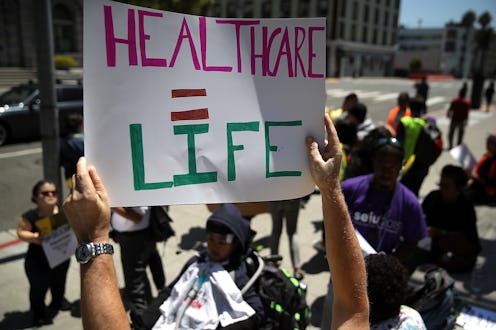News
Here's What You Need To Know About Graham-Cassidy Covering Pre-Existing Conditions

Amid the anger surrounding the Graham-Cassidy repeal bill, there is a debate about whether or not pre-existing conditions are covered in the latest version of the Obamacare repeal. On Twitter on Wednesday night, President Trump praised the bill and its co-sponsor, Sen. Bill Cassidy, who in turn is lashing out at late night TV host Jimmy Kimmel for talking about — you guessed it — pre-existing conditions coverage in the Graham-Cassidy bill. You'd think the president or a senator whose name on the bill would be the authority on the matter, but you probably need to listen to Kimmel. People with pre-existing conditions could pay far more under the new plan.
Many Republicans appear to be on board with Graham-Cassidy, but one of the biggest issues critics take with the bill is that it would not protect people with pre-existing conditions the way that Obamacare does. The bill is all about the states, letting them implement what they see is the best health care coverage (while also reducing the federal money to pay for these initiatives compared with what they currently can get under the Medicaid expansion and in health insurance exchange subsidies).
That means that if your state gets a waiver for certain Obamacare regulations and you have asthma or are pregnant, your premiums would definitely go up, potentially by thousands of dollars. There's vague wording about the waiver applications contain something on "how the state intends to maintain adequate and affordable health insurance coverage for individuals with pre-existing conditions." That's no guarantee of coverage.
But that's not the way Republicans are framing it. Many have gone on cable TV to argue that pre-existing conditions are covered. So there's little to do but listen to Kimmel. "For lots of people, the bill will result in higher premiums, and as far as lifetime caps go, the states can decide on that, too — which means there will be lifetime caps in many states," Kimmel told his audience on Tuesday.
By Wednesday, the Jimmy Kimmel Live! host was acknowledging the ridiculousness of the situation, that you have to learn about health care policy from a late night comic and not politicians. "I don't want to turn this into a Kanye and Taylor Swift situation," Kimmel joked, while holding Sen. Cassidy to his word.
The Louisiana politician was a guest on the show back in May, promising that he wouldn't vote for any bill that didn't pass "The Jimmy Kimmel Test," which according to Kimmel means, "no family should be denied medical care, [emergency] or otherwise, because they can’t afford it." But now Kimmel says Cassidy "either doesn't understand his own bill or he lied to me."
Kimmel argued that the bill doesn't even beat the Cassidy test. "When he was on this publicity tour he listed his demands for a health care bill very clearly. These were his words: He said he wants coverage for all, no discrimination based on pre-existing conditions, lower premiums for middle-class families and no lifetime caps. And guess what? The new bill does none of those things," Kimmel pointed out.
The confusion over whether this bill provides coverage for pre-existing conditions seems to be a common theme. President Trump tweeted on Wednesday night, "I would not sign Graham-Cassidy if it did not include coverage of pre-existing conditions. It does! A great Bill. Repeal & Replace." Trump either received his information secondhand or just doesn't understand it, some on Twitter argued. Others called it "quite simply a lie."
Regardless of the motivation behind the information coming from top Republicans, it doesn't seem quite accurate. Furthermore, because there is no Congressional Budget Office report on the bill — and there won't be before a vote — it's impossible to say how many people would lose insurance as a result.
If you think Graham-Cassidy is a mistake, call your senators today. And then call the GOP senators on the fence, especially Sens. Susan Collins of Maine, Lisa Murkowski of Alaska, and John McCain of Arizona.